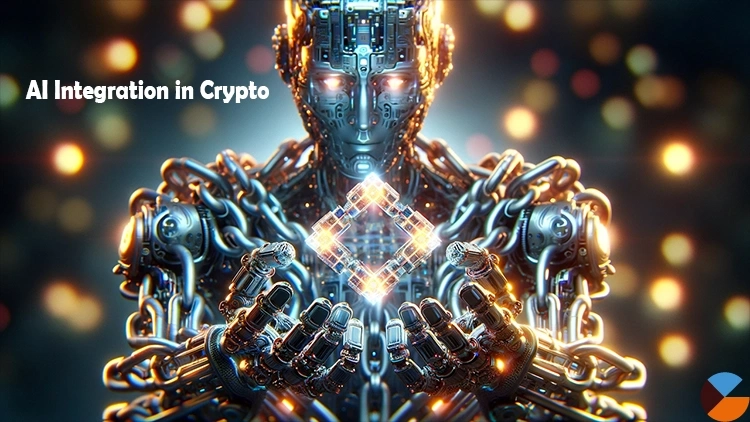AI Integration in Crypto: Transforming the Future of Digital Finance
Artificial Intelligence (AI) and cryptocurrency have emerged as two of the most transformative technologies of the 21st century. While both fields have independently driven innovation across various sectors, their convergence promises to revolutionize the future of digital finance. AI Integration in Crypto is not just a trend; it’s an evolution that is reshaping the way we interact with digital currencies, manage financial transactions, and secure decentralized platforms. In this article, we will delve into how AI is being integrated into the world of cryptocurrency, explore its benefits, and analyze the potential challenges and future implications of this synergy.
Understanding AI and Cryptocurrency
Before we dive into AI Integration in Crypto, it’s crucial to understand the individual components of this powerful combination:
Artificial Intelligence (AI): AI refers to the development of machines and software that can perform tasks typically requiring human intelligence. This includes problem-solving, decision-making, natural language understanding, and pattern recognition. AI systems can analyze vast amounts of data, learn from it, and make predictions or decisions based on that learning.
Cryptocurrency: Cryptocurrency is a digital or virtual form of currency that uses cryptography for security. Unlike traditional currencies issued by governments (fiat), cryptocurrencies operate on decentralized networks based on blockchain technology. Bitcoin, Ethereum, and other cryptocurrencies offer a peer-to-peer system that allows secure, transparent, and borderless transactions.
The intersection of these two fields is where the magic happens. AI Integration in Crypto brings enhanced capabilities, including automation, improved security, more efficient trading, and predictive analytics.
How AI Is Being Integrated Into Crypto
The application of AI in the cryptocurrency space can be observed in several key areas:
1. Trading Bots and Automation
One of the most significant aspects of AI Integration in Crypto is in automated trading. AI-powered trading bots can analyze market trends, historical data, and price fluctuations to make quick decisions and execute trades autonomously. These bots operate 24/7, unlike human traders, and can adapt to volatile market conditions in real-time.
AI algorithms enable these bots to detect patterns in the market, predict price movements, and make trades at optimal times, thus increasing profitability. For example, machine learning models can learn from previous trading data to optimize strategies and reduce losses. Traders who integrate AI bots can benefit from increased efficiency, lower risks, and reduced emotional bias.
2. Fraud Detection and Enhanced Security
Security is one of the primary concerns in the cryptocurrency world, as the decentralized nature of blockchain makes it an attractive target for hackers. AI Integration in Crypto plays a pivotal role in enhancing security by identifying fraudulent activities, detecting anomalies, and mitigating cyberattacks.
AI systems can process enormous amounts of transaction data to detect patterns indicative of fraud. They can recognize suspicious behavior, such as unauthorized access or unusual transaction volumes, and alert users or administrators in real-time. AI can also be used to strengthen encryption algorithms, providing an additional layer of security to blockchain networks.
For instance, AI can identify phishing attacks, malware, or suspicious wallets by continuously monitoring network activity. By integrating AI, crypto platforms can safeguard users’ funds and maintain the trustworthiness of the system.
3. Predictive Analytics for Market Forecasting
Another significant advantage of AI Integration in Crypto is its ability to predict market trends through advanced data analysis. Cryptocurrency markets are notoriously volatile, and making informed decisions is crucial for investors and traders. AI can process vast datasets, including historical price data, social media sentiment, and global economic indicators, to provide accurate predictions about market movements.
Machine learning models can learn from historical patterns and external factors, such as government regulations or macroeconomic trends, to forecast future price movements. This predictive capability is invaluable for both institutional and individual investors who want to minimize risks and maximize profits.
AI-based predictive analytics are also helpful for ICO (Initial Coin Offering) evaluations, helping investors assess the potential success of new cryptocurrency projects by analyzing similar ventures and market conditions.
4. Smart Contracts and Automation
Blockchain technology enables the creation of smart contracts—self-executing contracts with terms directly written into code. AI Integration in Crypto can make these smart contracts even more sophisticated by automating complex processes and making them adaptive to new conditions.
For example, AI can monitor the external environment and automatically adjust the parameters of a smart contract based on predefined triggers. This could include everything from executing payments to adjusting supply chain logistics based on real-time data.
By combining AI with smart contracts, decentralized applications (dApps) can become more efficient and responsive to real-world conditions, reducing human intervention and minimizing errors.
5. Tokenization and Asset Management
The tokenization of assets, from real estate to art, has become a popular application of blockchain. AI Integration in Crypto can further enhance tokenized asset management by providing better portfolio management solutions, risk assessment tools, and optimization strategies.
AI algorithms can analyze portfolios in real-time, recommending adjustments based on market trends, historical performance, and investor risk tolerance. Additionally, AI can help automate the rebalancing of portfolios, ensuring that they stay aligned with an investor’s long-term goals.
AI also plays a key role in developing decentralized finance (DeFi) platforms by providing liquidity management, yield farming optimizations, and risk assessment for lending and borrowing platforms.
Benefits of AI Integration in Crypto
The integration of AI into the crypto space offers numerous benefits, including:
1. Increased Efficiency
AI can handle complex computations and analyze vast amounts of data much faster than humans. In trading, AI bots execute trades in milliseconds, making decisions based on data that would take humans much longer to process. This increased efficiency helps traders capitalize on market opportunities and reduces the chance of human error.
2. Improved Security
AI’s ability to detect suspicious patterns and abnormal activities adds an extra layer of protection against fraud and cyberattacks. This is crucial in a decentralized ecosystem where users are responsible for their own security. AI Integration in Crypto ensures that the blockchain networks remain secure and trustworthy.
3. Enhanced Decision-Making
AI provides data-driven insights that improve decision-making. Whether it’s predicting the next big market move or optimizing a portfolio, AI’s predictive power allows users to make more informed choices.
4. Automation
From trading to smart contracts, AI Integration in Crypto allows for the automation of processes that traditionally required manual intervention. This not only reduces operational costs but also eliminates human error and bias.
5. Personalization
AI-powered algorithms can personalize user experiences on crypto platforms. For instance, AI can tailor investment recommendations based on a user’s risk profile, trading habits, and financial goals. This level of customization enhances user engagement and satisfaction.
Challenges of AI Integration in Crypto
Despite the potential benefits, AI Integration in Crypto is not without challenges. Some of the key obstacles include:
1. Data Privacy Concerns
AI systems require vast amounts of data to function effectively. However, in a decentralized ecosystem like cryptocurrency, data privacy is paramount. Striking a balance between data collection for AI and user privacy can be difficult, and any mishandling of data could undermine the trust users have in the system.
2. Regulation and Compliance
The regulatory landscape for both AI and cryptocurrency is still evolving. Governments and regulatory bodies are grappling with how to oversee AI algorithms in financial markets and blockchain ecosystems. Ensuring compliance with existing regulations while fostering innovation remains a challenge.
3. Complexity and Cost
AI systems are complex and require significant computational power. The cost of implementing and maintaining these systems may be prohibitive for smaller projects or platforms. Additionally, AI models need continuous updates to remain effective, which adds to the operational burden.
4. Potential for Manipulation
AI systems are not foolproof, and there’s a risk that malicious actors could manipulate AI algorithms to gain an unfair advantage in the market. Ensuring the transparency and integrity of AI systems in crypto trading is crucial to preventing market manipulation.
The Future of AI Integration in Crypto
The future of AI Integration in Crypto is incredibly promising. As both technologies continue to evolve, we can expect more seamless integrations that will drive innovation in decentralized finance, trading, and security. Here are some trends we are likely to see:
AI-Powered DeFi: Decentralized finance (DeFi) platforms will increasingly leverage AI for yield optimization, liquidity management, and automated lending and borrowing.
Quantum Computing and Blockchain: As quantum computing advances, AI systems will be crucial in securing crypto networks from potential quantum-based attacks.
Regulatory AI Models: AI systems will be developed to help crypto platforms ensure compliance with regulatory frameworks, reducing the risk of penalties and improving transparency.
AI-Enhanced Wallets: We may see AI-integrated wallets that offer personalized recommendations, enhanced security features, and intelligent transaction management.
AI Integration in Crypto is reshaping the digital finance landscape by introducing automation, enhanced security, predictive analytics, and intelligent asset management. While the challenges are real, the benefits of combining AI with cryptocurrency far outweigh the risks. As these technologies continue to mature, their synergy will open up new possibilities for traders, investors, and users alike, transforming the future of decentralized finance and digital currencies.









 Ingning
Ingning







